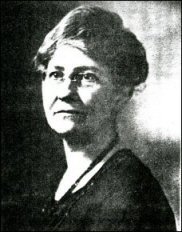|
 |
|
 |
Wednesday, March 17, 1948
How little the modern young wife knows of hard-ship. Her great-grandmother, with her never-ending, unmechanized housework, toiled from dawn till dark, caring for babies, preparing those heavy meals, weaving, spinning, fashioning the heavy cloth into equally heavy garments or making the coarse linen for all kinds of uses, dipping candles, washing at the brook, sanding the floors, and with all this labor, caring for her sick. Besides all that, she helped in the care of her sick neighbors. And while they were a rugged race, they had much sickness, too, many of their ailments now preventable.
So often the tired women after a day of strenuous labor in their own home sallied forth to "watch" in that of a neighbor, often helping to usher in a new life or to close the eyes of the dying. They were kind to one another and generous with their few remedies and their precious strength.
Hygienic principles were seldom observed; bacteria and related organisms were unknown. Contagion was not dreaded except perhaps in small-pox, which was quite common. The causes of diseases were not known. Dangers from contamination from house-flies, for instance, had never occurred to them. Parents would feed babies food that they themselves had masticated. So those who could, helped in the care of their sick neighbors. It is a miracle in the face of modern knowledge and medication that anyone survived the pioneer period.
Many of them did live to great age, however, leaving many descendants to carry on their traditions and good thinking. There was little time, though, for nervous break-downs or imaginary illnesses. There were in some settlements doctors who rode horse-back miles and miles visiting his widely scattered patients. The roads we would now call impassible. Last summer, when a young doctor visited here with an idea settling in this village, he had to be assured of our fine, hard-topped roads all through the town. Our first doctor, Francis Parker, settled here in 1820 and visited his patients on horse-back as far as Hopkinton, often following a mere path through the woods.
So every day for the woman of a century ago was full, often far into the night. She helped make the soft soap, the only kind she used in washing and cleaning. She nursed the little lambs and calves through the bitter winter. She made the candles, the clothing, she knitted the socks and stockings, she helped boil down the sap for maple sugar. She found time to make exquisitely beautiful quilts, hooked rugs and cross stitching. She taught her children from the Bible in which she had the most reverent and implicit belief.
She found time to "go visitin'" for a whole day or longer, occasionally bundling the latest baby and her knitting into the ox-cart, spending plenty of time on the road. She attended "meeting" when possible, and had a "donation" for the itinerant preacher. Sometimes a pedlar came along and asked to stay in her home, perhaps a week or more, or a traveling shoe-maker spent several days making and mending the family shoes.
As a general thing, a mother taught the little ones the alphabet and some number work before they entered school. They had to know, too, very early, in what town they lived and the name of the President of the U. S. They could count and do simple additions by the time they were five. Probably their first readers were the Bible and Guffey's Reader, with a sprinkling of Pilgrim's Progress. They were told about Goldilocks and Cock Robin while still babes, so the world of phantasy was not hidden from them. The mother knew many songs which she sang at bed-time to the little ones who had only their mother as their nurse, and a rocking-chair close to the old roaring stove, casting lovely dancing shadows on the smoked ceiling, was their only nursery.
Ah, how busy, how sane, how self-sacrificing was the pioneer woman of a hundred years ago. Would it be possible to gauge her influence on succeeding generations in her town and her country? Every town should have a monument dedicated to her conscientious devotion to duty and the legacy she left in her offspring who, on carrying out her teachings, made this country possible. We are all the right kind of examples of her honesty, her industry and her faithful performance of the hard duties which fell to her in those meager days of unmitigated hardships.
|